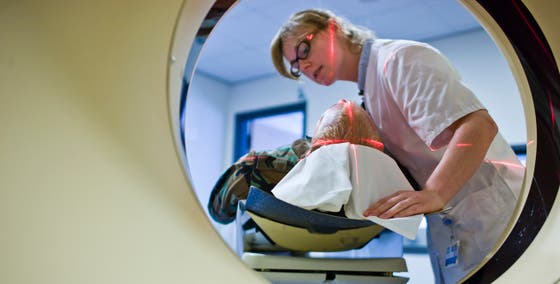What we do
What we do
At UMC Utrecht we focus on health; every day. In our view, all those who need our medical care are unique individuals with their own wants, needs and preferences. We work together with patients to attain their maximum health. With patient satisfaction as a prerequisite, patients can be assured of our outstanding medical quality and safety. We aim to conduct exceptional research on the international stage, which we then quickly translate into our own patient care and towards patient care elsewhere, so that our care manifestly produces the best possible results.

Strategic programsuitklapper, klik om te openen
We have made choices, selecting fields (strategic programs) in which we excel in healthcare, research and training. UMC Utrecht has several expertise centers in these fields to which patients and medical professionals know they should turn for oncology, neurology, cardiovascular medicine and pediatrics. Furthermore, we take the lead in the wide-ranging field of prevention of infections and chronic inflammatory diseases like rheumatism. We are also known for regenerative medicine, an innovative field in which we provide new treatments for hematologic disorders, cartilage and cardiac valve problems. All basic specializations are represented in our hospital, in addition to the centers in the above-mentioned fields.
Collaborationuitklapper, klik om te openen
We believe that health can only be improved by collaborating with our patients and parties in healthcare, education, science and the business community. Only then can we tackle the right problems and take medical innovations forward. Patients should be treated where it is best for them. To ensure this, we continuously exchange knowledge and experience with partners in the healthcare chain of first line (e.g. the general practitioner), fellow hospitals, and institutes for domiciliary care, rehabilitation, mental healthcare and nursing & care. The medical specialists at UMC Utrecht are solution-oriented, work together and seek in conjunction with the patient the right medical treatment within UMC Utrecht or elsewhere.
Strategy 2020-2025uitklapper, klik om te openen
Clear communicationuitklapper, klik om te openen
We aim to provide transparency towards our patients, those who refer patients and other stakeholders concerning what UMC Utrecht has to offer. By communicating consistently and unequivocally, we strive to prevent uncertainties and dissatisfaction.
We are cost-consciousuitklapper, klik om te openen
The OPEX program (derived from Operational Excellence) motivates, guides and facilitates members of staff actively engaged in working on points for improvement vis-à-vis work processes, be this in terms of health care, administration or purchasing.
OPEX has now been running for several years and is making excellent progress. Staff are enthusiastic about it, and good results are being achieved. There are three major benefits to the OPEX program: improved health care safety, more job fulfillment for staff, and UMC Utrecht is able to do more with less money.
we renew careuitklapper, klik om te openen
At UMC Utrecht, we pioneer innovations and targeted research for the future. Our motto is planning makes good ideas a reality. Everything we do is aimed at putting scientific results into products and services of social value. We encourage and support talent, entrepreneurship, and innovation in a variety of ways.
The following are a few examples of our recent projects:
- Ureka Mega Challenge
- Pontes Medical
- Unovate
- Utrecht Holdings
- Medical apps in MAC3
Quality and Safetyuitklapper, klik om te openen
UMC Utrecht offers patients the best and safest care, day and night, 365 days a year. In order to ensure consistency each employee is accountable for the quality and safety of the care they deliver and facilities they use anywhere, and at any time.
The mission: In 2015, UMC Utrecht will have all its quality and safety for health care, research and education made measurable and verifiable. At a national level, we wish to be distinguished as the leaders in patient safety and quality of care.
Animal testinguitklapper, klik om te openen
Veterinary and medical-biological research is carried out at UMC Utrecht and Utrecht University. In addition to experiments involving cell and tissue culture techniques, computer simulations and human volunteers, animal experiments are also performed. Laboratory animals are also used for educational and training purposes. The UMC Utrecht and Utrecht University have a joint Animal Research Laboratory.
Animal testing is still indispensable in much biological, medical and veterinary research. It helps us acquire knowledge about how humans and animals function and it helps us learn more about how certain diseases develop and how they can be treated or cured.
All experiments involving animals are subject to strict conditions:
- There is no other way of achieving the educational or research goal
- The 3 Rs of Reduction, Refinement and Replacement are taken into account in the design of the animal experiment and applied where possible
- The societal importance of the research is evident
- The Animal Experiments Committee has assessed whether the importance of the animal experiment outweighs the use of and the suffering caused to the laboratory animal
- A license has been issued by the Central Animal Experiments Committee (in Dutch)
For more information, please visit the website of Utrecht University and the jointly established Utrecht Animal Welfare Body of UMC Utrecht and Utrecht University.


Social responsibilityuitklapper, klik om te openen
Sustainability, in the broadest sense of the word, is high on the strategic agenda of UMC Utrecht. Through our dedication to CSR (Corporate Social Responsibility) we strive for balance between People, Planet, and Profit. On a practical level, we encourage sustainability by using like-minded suppliers, encouraging healthy diets, reducing food waste, and using a certified environmental management system (ISO 14001). We constantly ask ourselves what impact our work has on the environment, our communities, and how we can leave a sustainable legacy for the future.